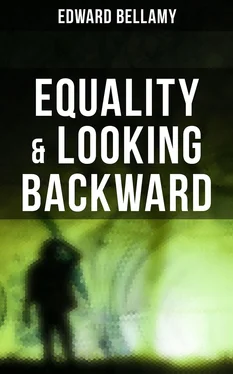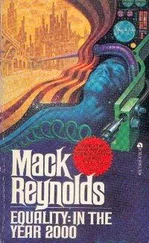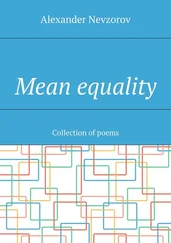“Not at all. I have made my selections.” With that she touched a button, and in a moment a clerk appeared. He took down her order on a tablet with a pencil which made two copies, of which he gave one to her, and enclosing the counterpart in a small receptacle, dropped it into a transmitting tube.
“The duplicate of the order,” said Edith as she turned away from the counter, after the clerk had punched the value of her purchase out of the credit card she gave him, “is given to the purchaser, so that any mistakes in filling it can be easily traced and rectified.”
“You were very quick about your selections,” I said. “May I ask how you knew that you might not have found something to suit you better in some of the other stores? But probably you are required to buy in your own district.”
“Oh, no,” she replied. “We buy where we please, though naturally most often near home. But I should have gained nothing by visiting other stores. The assortment in all is exactly the same, representing as it does in each case samples of all the varieties produced or imported by the United States. That is why one can decide quickly, and never need visit two stores.”
“And is this merely a sample store? I see no clerks cutting off goods or marking bundles.”
“All our stores are sample stores, except as to a few classes of articles. The goods, with these exceptions, are all at the great central warehouse of the city, to which they are shipped directly from the producers. We order from the sample and the printed statement of texture, make, and qualities. The orders are sent to the warehouse, and the goods distributed from there.”
“That must be a tremendous saving of handling,” I said. “By our system, the manufacturer sold to the wholesaler, the wholesaler to the retailer, and the retailer to the consumer, and the goods had to be handled each time. You avoid one handling of the goods, and eliminate the retailer altogether, with his big profit and the army of clerks it goes to support. Why, Miss Leete, this store is merely the order department of a wholesale house, with no more than a wholesaler’s complement of clerks. Under our system of handling the goods, persuading the customer to buy them, cutting them off, and packing them, ten clerks would not do what one does here. The saving must be enormous.”
“I suppose so,” said Edith, “but of course we have never known any other way. But, Mr. West, you must not fail to ask father to take you to the central warehouse some day, where they receive the orders from the different sample houses all over the city and parcel out and send the goods to their destinations. He took me there not long ago, and it was a wonderful sight. The system is certainly perfect; for example, over yonder in that sort of cage is the dispatching clerk. The orders, as they are taken by the different departments in the store, are sent by transmitters to him. His assistants sort them and enclose each class in a carrier-box by itself. The dispatching clerk has a dozen pneumatic transmitters before him answering to the general classes of goods, each communicating with the corresponding department at the warehouse. He drops the box of orders into the tube it calls for, and in a few moments later it drops on the proper desk in the warehouse, together with all the orders of the same sort from the other sample stores. The orders are read off, recorded, and sent to be filled, like lightning. The filling I thought the most interesting part. Bales of cloth are placed on spindles and turned by machinery, and the cutter, who also has a machine, works right through one bale after another till exhausted, when another man takes his place; and it is the same with those who fill the orders in any other staple. The packages are then delivered by larger tubes to the city districts, and thence distributed to the houses. You may understand how quickly it is all done when I tell you that my order will probably be at home sooner than I could have carried it from here.”
“How do you manage in the thinly settled rural districts?” I asked.
“The system is the same,” Edith explained; “the village sample shops are connected by transmitters with the central county warehouse, which may be twenty miles away. The transmission is so swift, though, that the time lost on the way is trifling. But, to save expense, in many counties one set of tubes connect several villages with the warehouse, and then there is time lost waiting for one another. Sometimes it is two or three hours before goods ordered are received. It was so where I was staying last summer, and I found it quite inconvenient.” 2
“There must be many other respects also, no doubt, in which the country stores are inferior to the city stores,” I suggested.
“No,” Edith answered, “they are otherwise precisely as good. The sample shop of the smallest village, just like this one, gives you your choice of all the varieties of goods the nation has, for the county warehouse draws on the same source as the city warehouse.”
As we walked home I commented on the great variety in the size and cost of the houses. “How is it,” I asked, “that this difference is consistent with the fact that all citizens have the same income?”
“Because,” Edith explained, “although the income is the same, personal taste determines how the individual shall spend it. Some like fine horses; others, like myself, prefer pretty clothes; and still others want an elaborate table. The rents which the nation receives for these houses vary, according to size, elegance, and location, so that everybody can find something to suit. The larger houses are usually occupied by large families, in which there are several to contribute to the rent; while small families, like ours, find smaller houses more convenient and economical. It is a matter of taste and convenience wholly. I have read that in old times people often kept up establishments and did other things which they could not afford for ostentation, to make people think them richer than they were. Was it really so, Mr. West?”
“I shall have to admit that it was,” I replied.
“Well, you see, it could not be so nowadays; for everybody’s income is known, and it is known that what is spent one way must be saved another.”
2.I am informed since the above is in type that this lack of perfection in the distributing service of some of the country districts is to be remedied, and that soon every village will have its own set of tubes.
Table of Contents
When we arrived home, Dr. Leete had not yet returned, and Mrs. Leete was not visible. “Are you fond of music, Mr. West?” Edith asked.
I assured her that it was half of life, according to my notion.
“I ought to apologize for inquiring,” she said. “It is not a question that we ask one another nowadays; but I have read that in your day, even among the cultured class, there were some who did not care for music.”
“You must remember, in excuse,” I said, “that we had some rather absurd kinds of music.”
“Yes,” she said, “I know that; I am afraid I should not have fancied it all myself. Would you like to hear some of ours now, Mr. West?”
“Nothing would delight me so much as to listen to you,” I said.
“To me!” she exclaimed, laughing. “Did you think I was going to play or sing to you?”
“I hoped so, certainly,” I replied.
Seeing that I was a little abashed, she subdued her merriment and explained. “Of course, we all sing nowadays as a matter of course in the training of the voice, and some learn to play instruments for their private amusement; but the professional music is so much grander and more perfect than any performance of ours, and so easily commanded when we wish to hear it, that we don’t think of calling our singing or playing music at all. All the really fine singers and players are in the musical service, and the rest of us hold our peace for the main part. But would you really like to hear some music?”
Читать дальше










